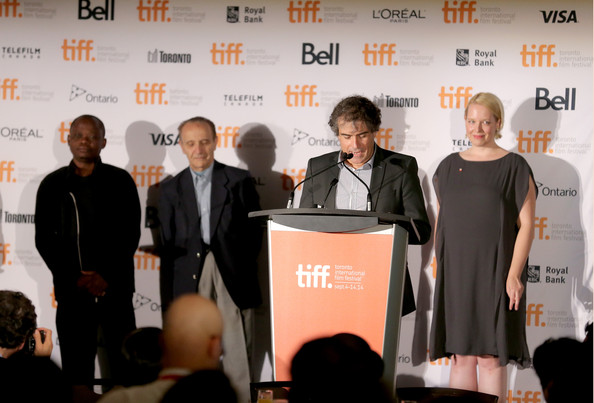Reviews include Superman, Apocalypse in the Tropics, and To a Land Unknown.
FIPRESCI Diary: Toronto International Film Festival, part two
September 19, 2014
By Thom Ernst
Of the 29 films in competition for the FIPRESCI jury prize at TIFF this year, 16 were part of the Discovery programme, while the remaining 13 were in the Special Presentation programme. Our 6 member jury divided up between Discovery and Special Presentations, with Jorge Gutman (Montreal, Canada), Marco Lombardi (Italy) and a late arriver (visa problems) Tèlesphore Mba Bizo (Cameroun) on the latter, while I joined FIPRESCI president Dana Linssen (Netherlands) and Ola Salwa (Poland) on the former. Even without the division, 29 films seems a minor workload in terms of festival viewing, but one of the unwritten rules about attending a festival – as a jury member or press representative – is to refrain from complaints.

A filmmaker friend tells me this story: it was at a festival other than TIFF that a jury member (not necessarily FIPRESCI) took to the stage and, prior to announcing the award, lamented the hours of work and effort it went into viewing each film. Around the time the speaker got to the part about the exhausting dedication it takes to sit on a jury, a voice from the audience said, “Really? Try making a movie.” Whether the incident occurred or not, it remains a fine parable and one I kept in mind through the duration of my jury duties. I share this story with my colleagues and it becomes somewhat of a mantra. We recognize that sitting on a festival film jury is not a task, but an honour. And we hold to that no matter how many hours of exhausted effort we put into watching each film.
Following an initial meeting, contact with my jury compatriots was limited to emails and text messages. The exchanges were short; curt dismissals of films we disliked, guarded praise for the ones we admired. Rarely did opinions match.
Most of the films in the Discovery programme stand on the strength of their political and social engagement. Mardan, filmed in Kurdistan, is a glimpse into the volatile world of a country in conflict. It’s a stunning debut from Batin Ghobaditold in a narrative style worthy of Antonioni.
In Her Place, a Canadian/South-Korean co-production from director Albert Shin, is a tragic journey into the world of surrogate motherhood, infertility and depression. The only other Canadian film (and the most polarizing film in competition) is Jeffrey St. Jules musical-science fiction-pastiche Bang Bang Baby, which a separate jury named Best Canadian First Feature.
Movies like director Ken Kwek’s caper thriller, Unlucky Plaza, based on real events, strive for a brand of North American comedic-crime formula.
From Brazil, director Gregoria Graziosi’s Obra ran on the power of its stunning cinematography; a black-and-white vista of a city whose architecture is under siege, and history, in terms of the dead and buried literally becomes unearthed. Comparative in visuals only (this one in colour) is Jan-Willem van Ewijk’s beautifully shot story of a lone man surfing the waves of the Atlantic in… hisfilm titled Atlantic.
Three films wove the narratives of several characters to reach one story: Carlos Vermut’s Magical Girl (Spain), Tala Hadid’s The Narrow Frame of Midnight (Morocco/UK/France, La Salada (Argentina) and Sway (USA/France/Thailand) by Rooth Tang. Magical Girl borrowed its style from noire to tell the story of how a father’s attempt to fulfill his dying daughter’s final wish turns into a series of tragic events. The Narrow Frame of Midnight, meanwhile, combines the standards of a road movie with the politics of poverty (in which children are a commodity to be bought and sold). Sway was the most ambitious, tracing three very separate stories while maintaining a structure and thread throughout the narrative.
Themes of identity, not as in a state of personal crisis, but where identity is directly lifted, stolen or lost, are the driving force in films like Isidora Marras’ lightly Hitchcockian, I Am Not Lorena (Chile/Argentina) and in The Great Man (France) directed by Sarah Leonor. The theme plays modestly under Debbie Tucker Green’s The Second Coming (UK), a film that is explained entirely in its title.
Then, in an abrupt change of tone and pace, comes American Beginners, director Ross Katz’s brash comedic story about the crash and fall of an American boy-child forced to live with his more responsible sister and her family. A second film that stood out from the rest, by the nature of accessibility alone, is Morgan Matthews’ crowd-pleasing X+Y – the story of an autistic boy competing in the International Mathematical Olympiad. The film is helped by the presence of Asa Butterfield (The Boy in the Stripped Pajamas, Hugo) and Sally Hawkins.
With all films seen and accounted for, the jury was ready to meet again. We met first over dinner at King Street’s luxurious Spoke Club (graciously provided by TIFF), and then again at our final dissertation the Saturday before the awards ceremony. Our discussions reached a new level.
My push for Mardan faded after serious consideration, but my admiration for Magical Girl didn’t survive the first round. I appreciated May Allah Bless France! and recognized it as a serious contender for the jury prize, but I had a particular affection for X+Y, fearing it was potentially too commercial for FIPRESCI.
In the end, the FIPRESCI jury prize for the Discovery section TIFF2014 went to director Abd Al Malik’s May Allah Bless France! a solid debut about a young rap musician discovering his place through art, music and faith. I’m happy with the choice. The jury was unanimous.
The FIPRESCI jury prize for Special Presentation went to Oren Moverman’s Time Out of Mind (USA) a story of homelessness fueled by award-winning performances from Richard Gere and Ben Vereen. Time out of Mind wins over festival favourites such as Christian Petzold’s Phoenix (Germany) and Isabel Coixet’s Learning to Drive (USA).



